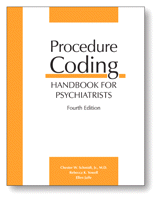Although many psychiatrists use evaluation and management (E/M) codes (the 99xxx codes) for their inpatient work, it might be equally appropriate to use these codes for outpatient encounters if what you are providing is more medical evaluation and management than psychotherapy. And it might mean that you could be better paid for your time when you see patients who present with complex problems.
Unlike the psychotherapy codes, which have no specific documentation guidelines (although psychiatrists are, of course, expected to document the time spent, diagnosis, and so on) the E/M codes, which are used by all physicians, have very specific documentation guidelines that were created by the Centers for Medicare and Medicaid Services (CMS). CMS published two sets of guidelines, one in 1995 and another in 1997. The 1997 guidelines, an abridged version of which is posted at <
www.psych.org/MainMenu/PsychiatricPractice/ManagingYourPractice/QuickPracticeInfo/Guidelines-for-EM-Services.aspx?FT=.pdf>, are the most relevant to psychiatry since they contain the documentation requirements for a single-system psychiatry exam. A CMS pamphlet explains how to use the E/M documentation guidelines at <
www.cms.gov/MLNProducts/downloads/eval_mgmt_serv_guide-ICN006764.pdf>.
Note that there is one exception to the E/M documentation requirements: when counseling and coordination of care account for more than 50 percent of the time spent with the patient (or on floor time for inpatient care), then the code is selected on the basis of the typical times listed for each E/M code in its descriptor.
E/M codes are selected on the basis of the complexity of the history, examination, and medical decision making that flows from the patient's presenting problem. To show the variations in payment: 90801 is valued at 4.53 RVUs in a nonfacility setting, while 99205, the highest level E/M code for an initial outpatient visit, which would be appropriate for a new patient with a complex and serious disorder, is valued at 5.80 RVUs, which could mean receiving approximately $43 more for the same exam.
In late February, APA sent a letter to each state's insurance commissioner expressing concerns that some insurers will not reimburse psychiatrists for providing E/M services. The letter points out that these codes are meant to be used by all physicians, and denying mentally ill patients access to E/M services from psychiatrists is clearly a violation of the Mental Health Parity and Addiction Equity Act. The majority of commissioners who have responded report that they do not believe this is a problem in their state—either because they've checked with major insurers who say they don't discriminate in this way or because they have received no complaints that this is occurring.
Irvin "Sam" Muszynski, director of APA's Office of Healthcare Systems and Financing (OHSF), suggests that the lack of complaints may be because so few psychiatrists are using the E/M codes in their practices. He reports that OHSF's Practice Management Help Line frequently receives calls from members who have contracts with insurers that permit them to bill using only the codes in the psychiatry section of CPT (the 908xx codes) or who think they are limited to using only these codes. Said Muszynki, "We recently discovered that the BlueCross/BlueShield plans in Illinois, Oklahoma, Texas, and New Mexico permit psychiatrists to bill E/M codes, although this was not previously understood."
OHSF is developing educational materials on how to use E/M codes that will be posted on APA's Web site, <
www.psych.org>. This year, American Psychiatric Publishing released the fourth edition of the
Procedure Coding Handbook for Psychiatrists, which has a chapter on E/M coding, and three appendices on CPT coding, as well one with documentation templates that support E/M coding
(Psychiatric News, June 17).
More information is available by calling APA's Practice Management Help Line at (800) 343-4671.

